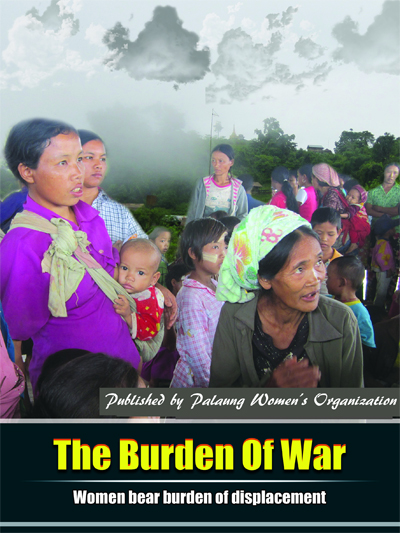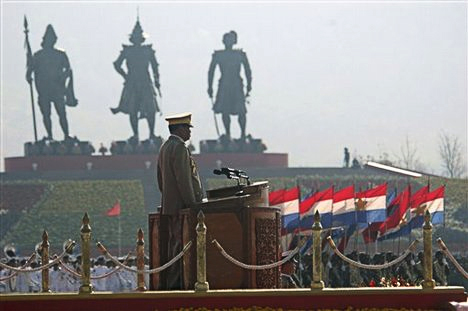I was thinking about catchwords – well known phrases that would reflect the situation and the players involved – when the Palaung Women’s Organization (PWO)’s The Burden of War report came into my hand yesterday.

I was born in the Loilong Namhsan aka Tawngpeng princely state, where the Palaungs, or Ta’ang as they now prefer to be called, are the majority. No wonder that I always have a soft spot within myself for everything that has to do with my birthplace. I wasted no time reading through the 30 page reports, half of them filled with photographs and diagrams.
It was about how 2,000 Palaungs in 15 villages went homeless, jobless, foodless, medicine-less and futureless just because the Burma Army wanted to secure the route of the oil and gas pipelines coming from Arakan in the southwest through northern Shan State into China’s Yunnan.
To anyone with a lick of common sense, the simple method is to lay down your cards to the local people as well as the armed groups in the area and seek a win-win solution. But that is not the Burma Army’s way. It has not been schooled in this common sense approach.
Its standard practice in dealing with a problem, as the Burmese saying goes, is “to remove (something) with a chisel instead of with a needle.” In others words, doing it the hard way (when there is an easy way out) is the Burma Army’s standard procedure.
Which reminds me of what Barbara Tuchman wrote in “The March of Folly”: Character is fate, as the Greeks believed. Germans were schooled in winning objectives by force, unschooled in adjustment. They could not bring themselves to forgo aggrandizement even at the risk of defeat.”
If I’m right – and I am sure I am – the big hurdle toward peace may not be “Federalism” on “Democracy” as the Opposition fears, but rather the Burma Army’s strongman psychology.
What about the Opposition, especially the armed opposition? What catchwords do we have to suit it?
The first one that pops up, even without thinking, is: He who has died once knows the price of planks, or its English equivalent, “Once bitten, twice shy.”

Everyone who understands how true it is in life will not blame the Kachins for their feet-dragging approach to the ceasefire talks and the Karennis for their seemingly overcautious attitude to the peace process.
Of course, not every armed movement can be compared with either the Kachins or the Karennis. Some of them, in fact, are taking it all in stride, virtually saying, “You can’t catch a tiger cub without going into the tiger cave.” One only hopes they are not only bent on catching the cub, but also be ready to tackle with its papa and or mama.
I’m sure there are still a lot of catchwords and proverbs which will come handy as the peace process moves hopefully forward. I just pray they are cited by others so I can sit back and learn.



